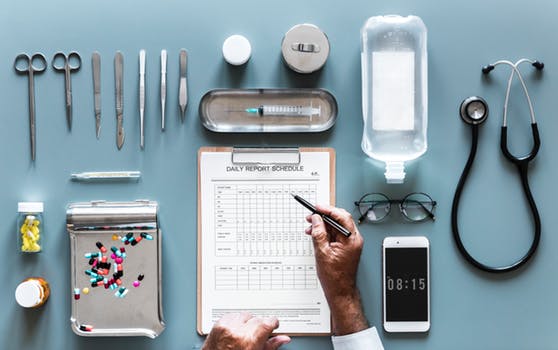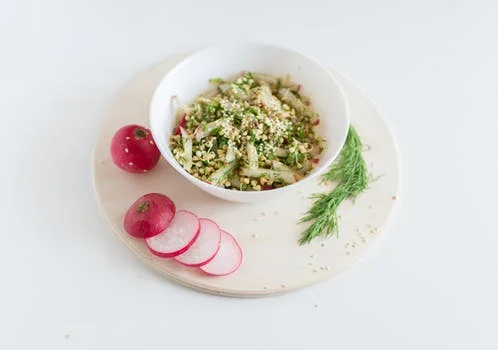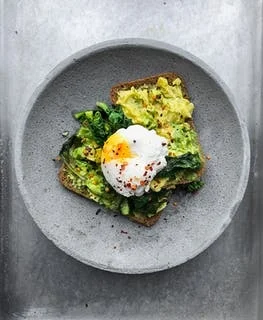We are constantly bombarded by "the latest" health and diet updates on the internet and from friends and family that convince us that this food is bad for our health, or that food makes us gain weight. We end up listening more to outside noise instead of listening to our own bodies. Not only that, we often go to extremes.
For example, we hear everywhere that carbs make us gain weight, so then we go cut out all carbs and next thing we know, we’re faced with constipation and a horrible hormonal imbalance.
So before you go to extremes, check out these common mistakes that many of us are making nowadays.
NOTE: Always keep in mind that each person is different and learning to understand your own body is #1. In many cases, working with a health coach to determine what works for YOU is extremely helpful.
5 common diet misconceptions and why they may be standing in the way of your health goals:
1) SALT IS BAD FOR YOU AND CAUSES WEIGHT GAIN
We've been told for decades to hold off on the salt for the sake of our hearts and blood pressure. However, salt is an essential mineral that has many vital functions in the body, and as we lose salt when we sweat and pee, it’s important to replenish the mineral. Low-sodium diets, especially in combination with a heavy workout schedule, can lead to low blood pressure, and more.
Studies show that low-salt diets may increase your risk of becoming hooked on sugary foods, which predispose you to weight gain. And many times, when people remove salt from foods, they replace it with sugar believe it or not, to remove bitterness of foods and add flavor. So be wary of extremes.
Instead of eliminating salt all together, opt for flavoring your foods with a combination of: a) GOOD QUALITY, less-refined and higher mineral salts such as pink Himalayan salt and Celtic salt, and b) dried and fresh herbs to condiment your foods – everything from pepper, cumin, coriander, nutmeg, turmeric, rosemary, basil, parsley, cilantro, fennel, ETC. They’re all amazing for your health, and help to add flavor to your meals without overdoing the salt. But again, some salt is essential as long as you avoid refined table salt. (Remember every person’s needs are different and make sure to consult with your health practitioner).
ps- there is an entire BOOK out on this topic worth browsing. Check it out HERE.
2) CUTTING OUT CARBS IS KEY FOR WEIGHT LOSS
While YES cutting carbs can help with weight-loss, extreme low-carb eating plans can be a digestive nightmare. Without any carbs, it’s hard to get enough fiber in your diet, especially SOLUBLE fiber, which frequently results in severe constipation.
Plus, healthy carbs (in small amounts) are crucial for energy. Stop eating them and you're likely to feel more tired and grumpy.
That being said, without a doubt most cultures nowadays eat far too many grain products given our on-the-go lifestyles: breakfast is toast or cereal, lunch is a sandwich, and dinner is pasta. That can lead to an imbalance in our diets - leading to imbalanced blood sugar - and a whole host of digestive issues, weight gain, and more. However, giving up carbs completely can also backfire.
Eating small amounts of healthy carbs, including whole grains is generally fine for most of us. (Exceptions are with certain conditions, like some autoimmune diseases, where eliminating all grains is extremely helpful).
Whole grains (particularly those that are naturally gluten-free), are a wonderful part of a healthy, balanced diet - eaten in SMALL AMOUNTS (I usually suggest no more than 1/2 cup cooked grains in 1 serving, and only 1-2 servings per day). Grains such as brown rice, wild rice, oats, quinoa, amaranth, teff and millet are all rich in fiber, protein, B vitamins, magnesium, selenium and more extremely crucial minerals and vitamins that support our overall health, especially our hormonal balance, energy and digestion. And believe me, a healthy balanced diet is essential for long-term weight loss!
Alternatively, if grains are an issue for you (or if you've opted for following a Paleo or Whole30 lifestyle) try to include some healthy grain-free carbs every day such as sweet potatoes, and even small amounts of plantain, malanga and yucca can be great.
3) RAW IS HEALTHIER
In the case of many veggies, yes, raw means the food is closest to its pure state of nature and contains most nutrients. When most foods are raw, the natural enzymes, vitamins, and minerals are undamaged.
However, this may be surprising, but in many cases, cooking is the key to unlocking the nutritional potential of certain foods. For example, tomatoes contain a powerful antioxidant called lycopene, which is increased and more available in cooked tomatoes than in raw. Cabbage, mushrooms, peppers, asparagus, spinach, and carrots all yield more bioavailable antioxidants when steamed or boiled than when raw.
Cruciferous vegetables (such as kale and broccoli) contain naturally occurring compounds called goitrogens, which can reduce thyroid function in some people. Cooking these vegetables significantly reduces the amount of goitrogens.
Also, raw vegetables can by hard-to-digest for many. Cooking softens food and makes it easier to digest, particularly when it comes to tough greens like kale, or again cruciferous veggies including cauliflower and broccoli. Coking foods allows us to eat many nutritious foods and have them pass through our systems optimally without bloating or other digestive issues.
In Ayurveda (ancient holistic healing system in India) they explain that cold, raw foods can impair your digestion, so if you suffer from constipation or other digestive issues, you should limit raw foods especially first thing in the morning and at night. Personally, when I began applying Ayurvedic wisdom and CUT BACK ON RAW SALADS (that I previous had almost every day for lunch and dinner), my digestion significantly improved!
4) EGGS ARE BAD FOR YOUR CHOLESTEROL AND LEAD TO HEART DISEASE
Eating eggs a few times a week doesn’t raise the risk of heart disease in healthy people. Yes, the yolks have cholesterol, but natural dietary cholesterol is actually not so bad for you, and alone won't trigger high-LDL or heart issues. New research shows that not all saturated fats are created equal, and small amounts of cholesterol can be beneficial for our health - especially coming from sources such as organic eggs, wild fish, grass-fed animal protein and organic coconut oil.
And for most of us, the amount of cholesterol found in any one food (such as eggs or coconut oil) isn’t bad; it’s the total amount of fats from everything you eat, particularly the processed foods. The bad fats causing heart problems and weight gain are primarily coming from cheap vegetable oils - which are used for almost all frying and packaged foods - that tend to be genetically modified and contain trans fats. Avoid oils such as soybean and canola. Read more on this topic HERE.
What’s more, eggs have a ton of beneficial nutrients, like omega-3s, that may lower the risk of heart disease. They’re a great source of lean protein with not too many calories nor fat, and easier to digest that many other animal proteins. One of my favorite healthy breakfasts is eggs with veggies, as it provides a great balance of nutrients needed to start off your day.
Note: Some unfortunate people do have a sensitivity to eggs, for which it’s good to try an elimination diet (or detox where you eliminate eggs and other potentially inflammatory foods for at least 10 days, then gradually add them back in) to test your sensitivity to eggs. Contact me for more on this topic.
5) A VEGETARIAN (OR VEGAN) DIET IS THE OPTIMAL HEALTHY DIET
I STRONGLY BELIEVE THAT EATING MORE VEGETABLES IS KEY FOR EVERYONE. But often people go on vegetarian diets without eating enough vegetables, and don’t do a good job of replacing all the key vitamins and minerals that are lost by eliminating the food group of animal protein – which ends up weakening the immune system, and more.
Going vegan is great for reducing our risk of many diseases and chronic conditions, plus, better for the environment and our fellow animals. However, most people focus too much on the part about eliminating meat, and not enough on eating a wide enough variety of vegetables, fruits, healthy fats, and other foods that help us get a healthy mix of vitamins, minerals, protein, and fiber.
Many vegetarians have low levels of Iron, vitamin B12, and healthy fats such as DHA and EPA (the two types of omega-3s found primarily in fish like wild salmon). That's a major concern because lack of iron and B12 affects our energy levels, the ability to think clearly, and the production of enzymes that fight infection (and more). Omega-3s are vital for your brain health, balanced hormones, a stable mood, and may help ward off depression. The risk of mood disorders is compounded if you don't get enough B12, which helps your brain produce feel-good neurotransmitters.
Plus, meat-free diets that don't include beans or eggs are usually very low in the quality protein needed to repair the microdamage to your muscles that comes from working out.
Lastly, most vegan and vegetarian diets end up being extremely high in carbs and sugar, as often they replace animal protein with more carbs, which again, can backfire and lead to weight gain.
So if you choose to go vegan/vegetarian, make sure you’re getting some quality protein at each meal (from seeds/nuts/legumes/algae combined with high-protein veggies), take an Omega-3 supplement, and you’ll probably benefit from a B-complex, too. And be wary not to overdo the carbs at each meal, especially simple carbs that convert quickly to sugar causing blood sugar imbalances.
READ MORE HERE about benefits of (small amounts of) good-quality animal protein.
So before you go crazy cutting out your saturated fats, salt, carbs and warming, cooked meals, tune in to your body and make sure you are nourishing your body with a WELL BALANCED DIET that is helping you vs. hurting you!
Love and Debunking Diet Myths,
Mariana




